A pair of current Off-Broadway productions present nontraditional interpretations of two of the most iconic male protagonists in Western literature — Hamlet, the indecisive melancholy Dane, and Jay Gatsby, the mysterious millionaire and symbol of American ambition. Both shows display gimmicky staging to plumb the depths of William Shakespeare and F. Scott Fitzgerald’s observations on the human condition, but they obscure the richer insights of both works, resulting in flashy productions and incomplete renderings of the original.

Credit: Joan Marcus
This Central Park Hamlet at the Delacorte is staged by hot, Tony-winning director Kenny Leon (A Raisin in the Sun, Topdog/Underdog, etc.) and is proficiently acted by a strong ensemble led by the emotionally articulate Ato Blankson-Wood who intensely delineates the title hero’s inner conflict between rational thought and raging revenge for his father’s murder by his uncle. It’s a scaled-down, sleek production clocking in at a little over two and a half hours which hits the major points of Hamlet’s tragic journey of self-reflection and existential angst. But what’s missing is the context of Denmark’s rotten state and by extension our corrupt world. What’s left is Hamlet’s personal trauma without the political context to give it a larger meaning.
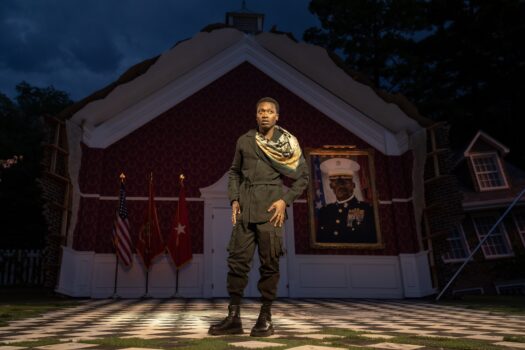
Credit: Joan Marcus
Leon has chosen to reference his own 2019 Central Park production of Much Ado About Nothing, setting it in the same universe, but not giving meaning to that setting or even making clear where we’re supposed to be. His all-black Much Ado took place in what seems to be an Atlanta suburb where the comic hero Benedick and company had just returned from fighting a war for social and racial justice. A huge banner declaring Stacy Abrams for President in 2020 adorned a handsome red-brick residence. The same set designer Beowulf Boritt has deconstructed his original Much Ado concept for Hamlet with the same house crooked and sinking into the ground, the banner for Abrams askew and half buried in the earth, and a jeep stalled amid overgrown bushes. Is Leon saying the usurper Claudius has betrayed the progressive ideals of his brother after poisoning him and stealing his throne? That point is never made.
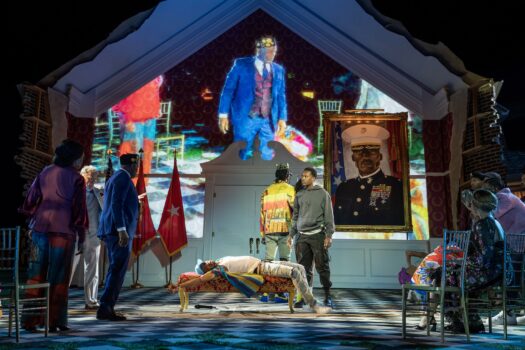
Credit: Joan Marcus
Leon has cut many of the scenes that would have given us this information. Gone are the opening scene where Horatio, Bernardo and Marcellus first encounter the ghost of Hamlet’s father and decry their country’s unstable status. Plus all scenes with Fortinbras, the decisive young conqueror from Norway who acts as a counterweight to Hamlet’s political and military ambivalence are likewise missing. The players’ scene where we witness a re-enactment of Hamlet Senior’s demise is abbreviated to a brief rap/hip-hop musical interlude with little impact.
On the plus side, Hamlet’s fateful confrontation with his father’s spirit is handled with bone-chillingly effective special effects thanks to Allen Lee Hughes’ harrowing lighting, Justin Ellington’s terrifying sound design, and Jeff Sugg’s ghostly video. The spirit’s shattering voice, provided by an uncredited Samuel L. Jackson, inhabits the expressive Blankson-Wood’s body like a demented demon.
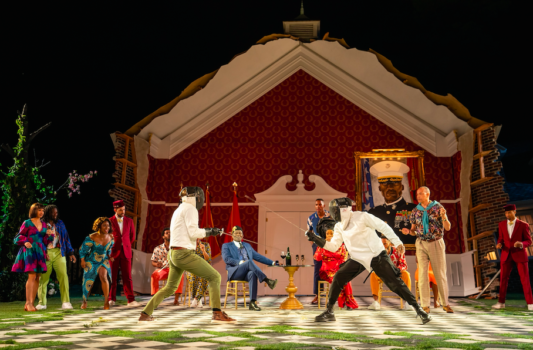
Credit: Joan Marcus
Fortunately, the able cast provide emotional heft to their roles and deliver a rounded portrait of a family and community in crisis. Blankson-Wood is a sturdy Hamlet, vivifying the conflicted protagonist’s inner turmoil and skillfully delivering the famous soliloquies. John Douglas Thompson is a formidable Claudius, making him more than just a conniving villain. His “My offense is rank” speech is a stand-out. Lorraine Toussaint’s Gertrude is equally robust, endowing her with a sexual life and motivation to hide from the truths her son reveals. As Ophelia, Solea Pfeiffer displays powerful pipes in several musical numbers. She doesn’t quite make the case for the maiden’s madness since her Ophelia appears too strong to succumb to insanity. Daniel Pearce’s Polonius is nicely understated and Nick Rehnerger’s Laertes is powerful. Greg Hildreth’s Gravedigger supplies much needed laughs. Tyrone Mitchell Henderson’s swishy Osric resorts to stereotypes. This production is a satisfactory and fast-moving Hamlet, but misses the necessary depth for a truly memorable one.
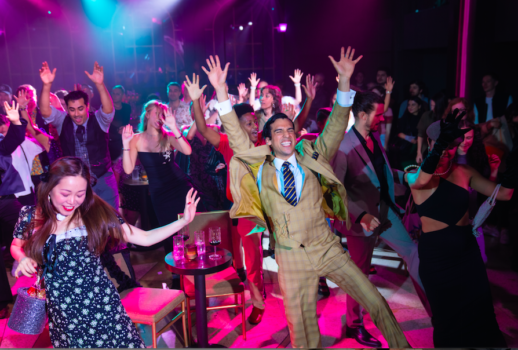
Credit: Joan Marcus
i>The Great Gatsby is as seminal a work as Hamlet, capturing the clashing values of American capitalism and romanticism and the deceptive lure of the American Dream. Like Leon’s muted take on the Melancholy Dane, the new immersive stage adaptation of Fitzgerald’s classic novel is flashy, but fails to plumb the subtext of Fitzgerald’s classic. The Great Gatsby—The Immersive Show arrives at the ballroom of the Park Central Hotel after a long run in London. Director-adapter Alexander Wright’s premise converts the action of the novel into a one big party at Gatsby’s estate. Audience members are encouraged to dress up in 1920s style, order a cocktail or two at the bar (I had one called the Daisy and it was delicious), dance the Charleston with cast members and follow characters into various side rooms for intimate scenes. (All the rooms are beautifully furnished by set designer Casey Jay Andrews. The jazzy musical score was composed and produced by Glen Andrew Brown and Tendai Humphrey Sitima with additional arrangements and additional composition by David Sims.)

Credit: Joan Marcus
The result is a fun evening, but you won’t gain any deep insights into one of the greatest works of American literature. What with period musical songs performed from a bandstand, theatergoers called upon to act as servants and pointlessly sweep up as Gatsby prepares for a long-delayed rendezvous with his lost love Daisy Buchanan, and scurrying from room to room, the impact of Gatsby’s tragedy and those in his circle gets lost amid the giggles and booze.
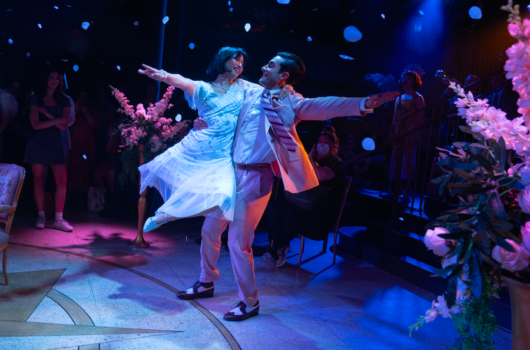
Credit: Joan Marcus
The characters and their story arcs so clearly delineated by Fitzgerald become blurred here. For instance, the shady manipulative underworld figure Meyer Wolfshein is menacing in the book, representing relentless criminal control. Here he’s a cross between a subordinate of Gatsby and an entertainer, regaling the crowd with a tap dance and trumpet solo to the Eddie Cantor classic, “If You Knew Susie.” Charlie Marcus does an excellent job with the musical requirements of the role, but he’s more a fuzzy teddy bear than a dangerous influence.
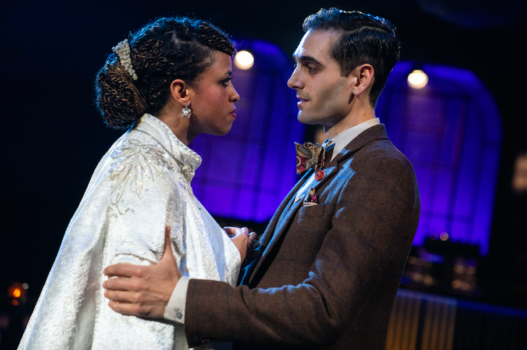
Credit: Joan Marcus
Claire Saunders manages to make Myrtle, the crude mistress to Daisy’s brutish husband Tom, into a sympathetic figure, even as she’s called upon to practically have sex with Tom (an appropriately bullying Shahzeb Hussain) in one of the side chambers. Keivon Akbari is equally pathetic as her hapless cuckolded husband George. As the narrator Nick Carraway, Rob Brinkman does his best to bring coherence and order to this rambling experience. Jillian Ana Abaya captures Daisy’s shattered innocence and Stephanie Rocio provides dash and spunk as her confidante, the liberated Jordan Baker. Joel Acosta makes for a handsome, virile Gatsby, but this version doesn’t allow us to get to know the real man beneath the glittering facade. For a light, frothy evening out, this immersive show is your ticket, but don’t expect anything to last longer than the bubbles in the champagne they’re selling. Try reading the book.
Hamlet: June 28—Aug. 6. Free Shakespeare in the Park at the Delacorte Theater, Central Park West and W. 81 St., NYC. Running time: two hours and 45 mins. including intermission. publictheater.org.
The Great Gatsby: The Immersive Show: June 25—Dec. 2. Park Central Hotel, 870 Seventh Ave., NYC. Running time: two hours and 30 mins. including intermission. immersivegatsby.com.
